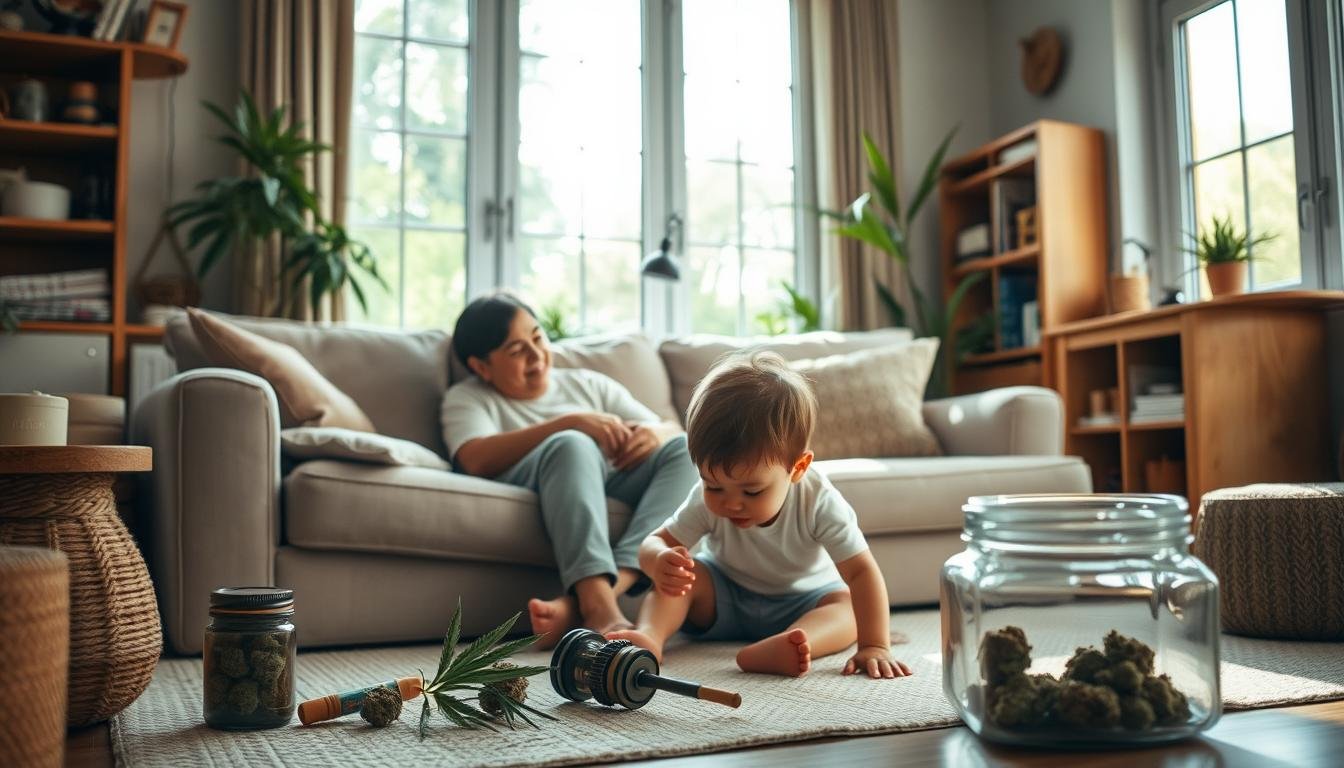Can you be a responsible parent and still use cannabis? As more states legalize cannabis, this question is becoming increasingly relevant for many parents.
The growing acceptance of cannabis culture has led to a rise in its use among parents. They use it for medicinal purposes and stress relief. But, this trend also raises important questions about child safety and the potential effects on child development.
This article aims to provide guidance for parents who use or are considering using cannabis. It offers cannabis parenting tips and insights into the complexities of being a stoner parent. It ensures the well-being of their children.
Key Takeaways
- Understanding the impact of cannabis use on parenting abilities.
- Guidance on having open weed family discussions.
- Strategies for balancing cannabis use with responsible parenting.
- Insights into the evolving cannabis culture and its implications for families.
- Tips for maintaining a safe and healthy environment for children.
The Changing Landscape of Cannabis in America
Cannabis laws are changing across the United States. Parents are now facing a complex and ever-changing world. Today, 38 states allow medical use of cannabis, and 24 states permit recreational use. This shows a big change in how people view and manage cannabis.
Legal Status Across States
The laws on cannabis differ from state to state. This creates a mix of rules that parents must follow. It’s important for parents who use cannabis to understand these differences.
Recreational vs. Medical Legalization
It’s key to know the difference between recreational and medical cannabis. Recreational cannabis is used for fun, while medical cannabis helps with health issues. Parents need to know the laws in their state to follow them.
“The distinction between medical and recreational cannabis is not just about legality; it’s about the purpose and impact of its use.”
Understanding Local Regulations
Parents also need to get local cannabis laws. For example, some states let you grow cannabis at home, but others don’t. Knowing local laws helps avoid legal trouble.
By keeping up with laws and following them, parents can handle the changing cannabis world well. This means being careful with cannabis parenting tips and how it affects their role as parents in the cannabis culture.
Understanding the Stigma Around Cannabis and Parenthood
To grasp the stigma around cannabis and parenthood, we must look at history and today’s views. The way parents are seen using cannabis is shaped by many factors. These include history, culture, and society.
Historical Context of Cannabis Prohibition
In the early 20th century, cannabis was seen as bad. People were told it made users deviant. This made its image worse, affecting how parents view it today.
Modern Stereotypes of “Stoner Parents”
The term “stoner parents” brings up images of neglect. But, many cannabis-using parents are caring and involved. The shame around cannabis can make parents feel guilty or ashamed, hurting their self-worth and confidence.
How Stigma Affects Family Dynamics
The stigma around cannabis can hurt family life in two main ways:
Impact on Parent-Child Relationships
Secrets about cannabis use can strain parent-child bonds. Being open helps to keep relationships strong and healthy.
Effects on Co-Parenting Arrangements
For co-parents, cannabis stigma can make things harder. It’s crucial to talk openly about cannabis use and its impact on parenting.
By understanding the history and stereotypes around cannabis use in parents, we can start to reduce stigma. This will help create a more supportive family environment.
Responsible Cannabis Use for Parents
Being a parent and using cannabis means setting clear rules. Health Canada says cannabis can make it hard to focus or make decisions. This shows why it’s important to use it responsibly.
Setting Boundaries and Safety Protocols
It’s key to have “cannabis-free” times and places, mainly when kids are around. This ensures cannabis doesn’t get in the way of parenting.
Creating “Cannabis-Free” Times and Spaces
Having areas or times where cannabis is not allowed is important. For instance, parents might not use it on school nights or when with their kids.
Designating Responsible Adults
When parents are using cannabis, having another adult watch the kids is crucial. This makes sure kids are safe and their needs are met.
Storage and Child Safety Measures
Keeping cannabis products safe from kids is a must. Using containers that kids can’t open and storing them in locked places helps a lot.
Childproof Containers and Locked Storage
Putting cannabis in containers that kids can’t open and storing them in locked places helps keep them safe. This stops kids from getting into them.
Keeping Edibles Secure
Edibles, which look like food, are a big risk for kids. They should be kept where kids can’t get them. Parents should be careful with how they package and throw away edibles.
By following these steps, parents can enjoy cannabis while keeping their kids safe. It’s about finding a balance that works for everyone in the family.
Essential Cannabis Parenting Tips for Navigating Daily Life
Parenting with cannabis requires careful planning. As more parents use cannabis, finding a balance is key. It’s important to manage cannabis use with family duties.
Creating a Healthy Routine
Creating a routine for the whole family is crucial. Set aside time for cannabis use that doesn’t clash with parenting. Parents should plan their cannabis use for their most stressful times to help with parenting, not hinder it.
Managing Consumption Around Family Time
It’s important to manage when and how you use cannabis around family time. Think about the timing and method to avoid affecting your interaction with kids.
Timing Your Use Appropriately
Timing is key for cannabis use and parenting. Using it after the kids are asleep is a good idea. It lets parents relax without missing out on parenting.
Choosing Consumption Methods Wisely
The way you consume cannabis matters. Opt for lower-THC options or methods with controlled effects to manage use better around family time.
| Consumption Method | Effects | Best For |
|---|---|---|
| Edibles | Long-lasting, intense | Relaxation after bedtime |
| Vaporizers | Quick onset, controllable | Stress relief during the day |
| Topicals | Localized relief, no psychoactive effect | Pain relief, skincare |
By considering these factors, cannabis-using parents can lead a balanced life that suits their family.
Talking to Your Kids About Weed: Age-Appropriate Approaches
Talking about weed with your kids needs careful thought. Start early and keep talking as they grow. This helps keep communication open.
Conversations with Young Children (Ages 5-8)
When talking to young kids about weed, use simple words. Explain that some medicines help, but weed is for grown-ups. This sets the stage for future talks.
Simple Explanations About Medicine vs. Adult Substances
Parents can explain that medicines help, but weed is for adults. Use examples kids can get. This helps them understand.
Establishing Safety Rules
Teach kids that weed is not a toy and is for adults only. It’s key to teach them never to touch or eat unknown things.
Discussions with Preteens (Ages 9-12)
Preteens might learn about drugs at school. Knowing this helps parents answer their questions better.
Addressing School Drug Education Programs
Ask your preteens about school drug lessons. Use this chance to share accurate, age-right info.
Answering Curious Questions Honestly
Preteens might ask direct weed questions. Answer truthfully, keeping in mind their age. This builds trust and keeps communication flowing.
By being open and informed, you can help your kids understand weed. This way, they’ll know its role in your family.
Legal and Ethical Considerations for Weed Family Discussions
Cannabis-using parents face unique challenges. These include legal custody battles and ethical dilemmas about modeling responsible behavior. As cannabis becomes more accepted, it’s crucial for parents to understand these complexities.
Custody and Family Court Issues
In some states where cannabis is legal, evidence of use can still be used against parents in custody battles. This could impact their parental rights. Parents must be aware of the legal landscape and how their cannabis use might be perceived.
Employment Considerations
Parents should also consider their workplace policies regarding cannabis use. Even in states where cannabis is legal, some employers maintain zero-tolerance policies. This could affect a parent’s employment.
Ethical Frameworks for Cannabis-Using Parents
Ethically, cannabis-using parents should strive to model responsible adult behavior. This includes being mindful of their consumption around their children. They should ensure it does not negatively impact their parenting.
Modeling Responsible Adult Behavior
Parents should consume cannabis responsibly. They should avoid excessive use and keep it out of reach of children. This demonstrates to children the importance of responsible behavior.
Consistency Between Words and Actions
It’s also vital for parents to be consistent between what they say and what they do. If parents discuss the risks of cannabis with their children, they should be prepared to explain their own use. They should do so in a way that is honest and educational.

By navigating these legal and ethical considerations thoughtfully, cannabis-using parents can work to create a healthy and open environment. This allows for open discussions about cannabis within their families.
Navigating Social Situations as Cannabis-Consuming Parents
Cannabis-using parents face new challenges in social situations. As cannabis culture grows, parents who use it must adapt. They worry about being judged or left out by others.
School Functions and Parent-Teacher Meetings
Going to school events and meetings can be tough. Parents might fear being judged by other parents or teachers. To handle this, they can:
- Share their cannabis use if they feel okay doing so
- Plan how to answer tough questions
- Focus on their child’s success and happiness
Playdates and Other Parents
Playdates and socializing with other parents can be tricky. Parents must choose whether to share their cannabis use or keep it private.
Disclosing vs. Privacy
Parents should think about their situation and how others might react. One parent said, “I’m open about my cannabis use because I want to show my kids that being honest and responsible is key.”
Handling Uncomfortable Questions
Answering tough questions about cannabis use needs tact and confidence. Parents can prepare by:
- Thinking about common questions and practicing answers
- Staying calm and confident when asked
- Changing the topic to their child’s interests or achievements
By being ready and confident, cannabis-using parents can handle social situations well. As the cannabis culture changes, parents should focus on their child’s well-being and their own comfort.
Being a responsible and caring parent is most important, no matter the cannabis use. By being true to themselves and open to talks, stoner parents can strengthen their bonds with their kids and other parents.
Building a Support Network for Stoner Parents
As a cannabis-using parent, finding a community that gets you can change everything. Connecting with others who understand your life can make you feel less alone. It helps break down the stigma around using cannabis.
Finding Like-Minded Parent Communities
Building a support network starts with finding communities of like-minded parents. These groups offer a safe place to share experiences, advice, and resources. They’re all about cannabis parenting.
Online Resources and Support Groups
Online forums and support groups are key for stoner parents. They’re a place to talk about cannabis culture and parenting. It’s a great way to get advice and share your own stories.
Social Media Communities
Social media has many groups for cannabis-friendly parenting. These online spaces are perfect for connecting, asking questions, and sharing your journey.
Local Meetup Options
Local meetups offer a chance to meet others in person. Many cities have groups for cannabis-using parents. It’s a great way to build local connections.
| Resource Type | Description | Benefits |
|---|---|---|
| Online Forums | Discussion boards for stoner parents | Access to a wide range of experiences and advice |
| Social Media Groups | Private or public groups on platforms like Facebook | Easy connection with others, sharing personal stories |
| Local Meetups | In-person gatherings for cannabis-using parents | Building local support networks, face-to-face interactions |

By using these resources, stoner parents can create a strong support network. This network improves their parenting and offers valuable tips on using cannabis.
Conclusion: Embracing Authenticity in Cannabis-Friendly Parenting
As more people in the U.S. accept cannabis, parents are sharing their use openly. This honesty is building a supportive community. Here, parents can talk about their experiences without fear of being judged.
There are now more tips for cannabis parents. These help them manage the challenges of using cannabis while raising kids. Also, more families are having open talks about weed, teaching kids about it in a way they can understand.
The cannabis culture is changing how we see stoner parents. Instead of being seen as different, these parents are finding support and understanding. By being themselves, they’re making families more welcoming to everyone.
As cannabis laws and attitudes change, it’s key for parents to stay informed. This way, they can guide their kids well while staying true to themselves. It’s about being honest and responsible in a changing world.
FAQ
What are the key considerations for parents who use cannabis?
Parents using cannabis should think about how it affects their kids. They should use it responsibly and keep it away from children. This means storing it safely and being careful when they use it at home.
How can parents balance cannabis use with family responsibilities?
It’s important to find a balance between using cannabis and taking care of family. Parents can manage their use around family time. They should also choose how they use it wisely.
What are the legal distinctions between recreational and medical cannabis?
Recreational cannabis is for fun, while medical cannabis helps with health issues. Knowing this helps parents follow the law when using, possessing, or growing cannabis.
How can parents discuss cannabis with their children?
Parents should talk about cannabis in a way that fits their child’s age and understanding. For little kids, explaining the difference between medicine and adult stuff is a good start.
What are the potential risks of cannabis use for parents in custody battles?
Using cannabis can hurt a parent’s chances in custody battles. Parents should think about how their use might look to others. They should act responsibly to protect their rights.
How can cannabis-using parents build a support network?
Joining groups of parents who use cannabis can help. Online groups and forums are great for sharing experiences and advice.
What are some tips for navigating social situations as a cannabis-consuming parent?
It’s hard to decide if to tell others about using cannabis. Parents should think about their situation and how others might react. They should answer questions confidently and tactfully.
How can parents ensure child safety around cannabis products?
Keeping cannabis products safe from kids is crucial. Use childproof containers and keep them locked away. This keeps edibles and other products out of reach.
What are some essential considerations for cannabis-using parents in the workplace?
Some jobs don’t allow cannabis use. Parents should know their workplace rules. They should think about how using cannabis might affect their job.
How can parents model responsible behavior around cannabis use?
Being consistent in what you say and do is key. Show kids the value of being responsible. Parents should act responsibly themselves, so their cannabis use doesn’t harm their kids.

